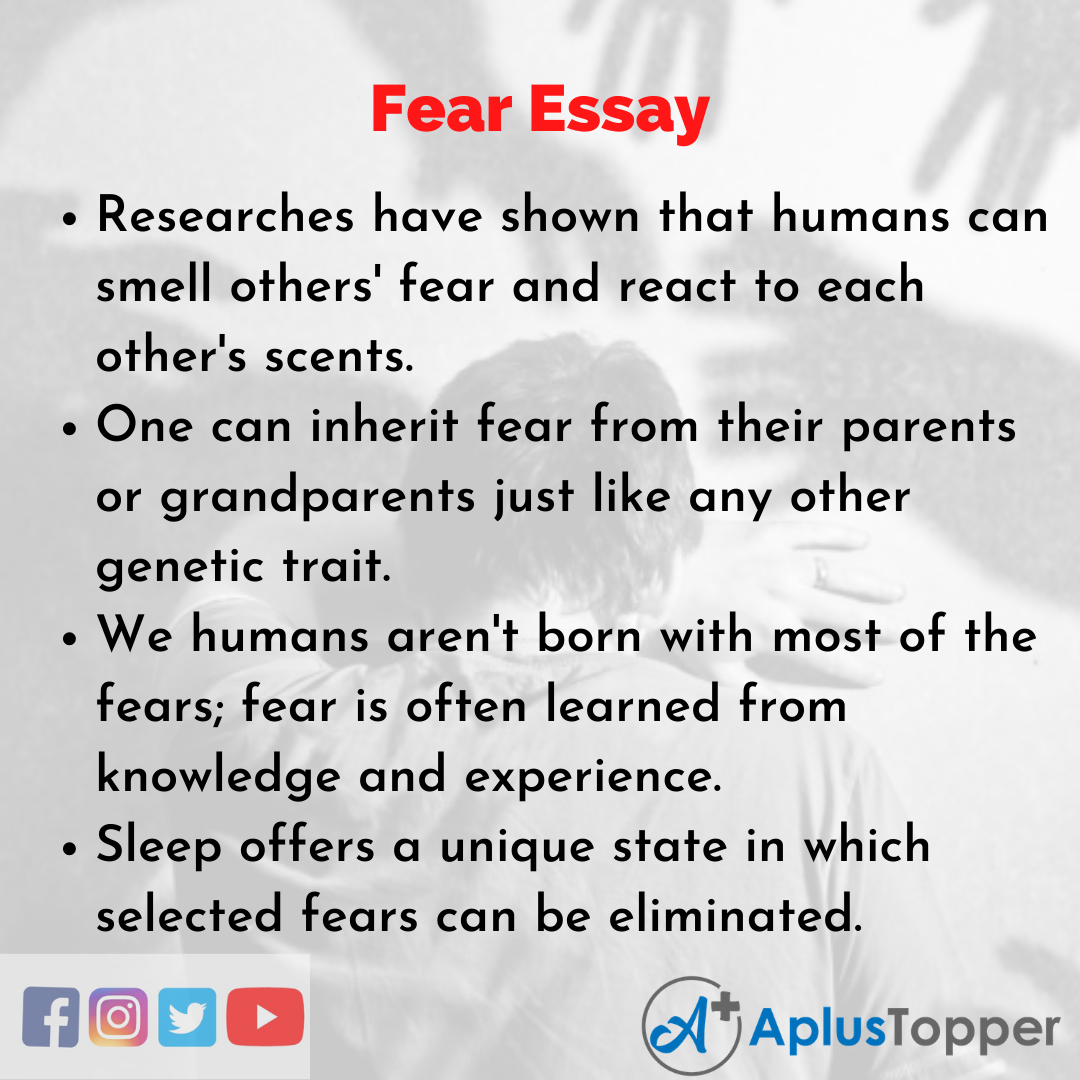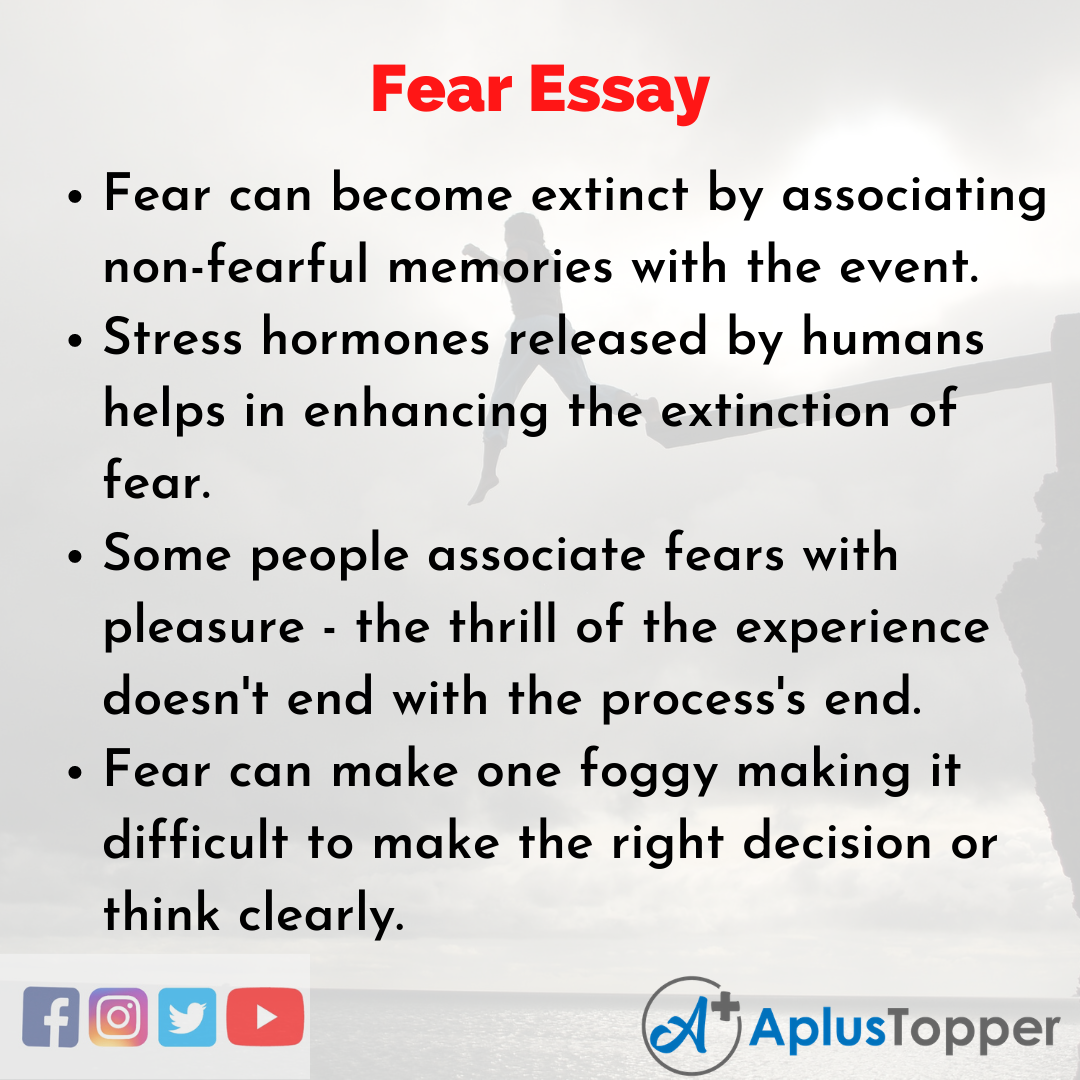Fear Essay: Fear is a natural, powerful, and primitive emotion experienced by humans, usually triggered by an unpleasant perception of danger that is either real or imaginary—fear causes psychological and, ultimately, behavioral changes in people.
Human beings experience fear as a response to a specific stimulus that occurs either in the present or in expectation or anticipation of a future threat that might be a risk to themselves. Response to any kind of fear varies from person to person.
You can also find more Essay Writing articles on events, persons, sports, technology and many more.
Long and Short Essays on Fear for Students and Kids in English
We are providing students with samples of a long essay of 500 words on the topic Fear and a short essay of 150 words on the topic Fear for reference.
Long Essay on Fear 500 Words in English
Long Essay on Fear is usually given to classes 7, 8, 9, and 10.
Fear, the quintessential human emotion, is an utterly unavoidable human emotion. The extent and range of fear from different things vary from person to person, but the emotion is the same. Fear is capable of causing psychological changes and, ultimately, behavioral changes in a person.
Humans experience fear as a response to a specific stimulus to a situation occurring in the present or an anticipated future threat that is a risk to oneself. The response to fear arises from the recognition of danger, leading to the confrontation of the situation or escaping the fear or avoiding the situation – also known as fight or flight response.
We all humans are programmed in a manner to recognize fear to avoid or reduce being harmed. Learning from the past about what can protect one in dangerous situations makes people capable of doing many things that one wouldn’t typically be able to or willing to respond to the threat.
Fear is broadly classified into two types, innate fears, and identity fears. Innate fears are the fears that every individual has on some level, and humans are born with these fears, which also serve as a kind of survival instinct. Humans develop identity fears as they evolve.
Apart from this, many people also fear love and connection. These fears are a subset of identity fears. As humans grow in their lives, they tend to grow connections with people, and these bonds become of great value to the person. Losing these bonds is one of the biggest fears of many.
Sometimes fear originates from real threats, but it can also originate from imagined danger – which makes fear experienced by people either rational or irrational. Rational fear is the fear of something that is real – occurring from something entirely possible or will occur. Fear of mortality is an example of a rational fear as we humans are immortal. However, irrational fears are necessarily implausible, but the fear arises from a real place in the psyche.
In some people, fear is also a response to mental health conditions such as anxiety disorders, panic attacks, phobias, post-traumatic stress disorder (PTSD). Phobia is an irrational or extreme or aversion of something. An aspect of anxiety disorder can be the tendency to develop a fear of fear.
Many people confuse fear of phobias. Fears are typical responses to objects or events. Still, fear becomes a phobia when the fear interferes with functioning correctly and maintains a consistent quality of life. Fear in humans involves a biochemical response to the situation as well as a high individual emotional response.
Fear is an emotion experienced in the mind, but it triggers some strong physical reaction in one’s body. As soon as one’s body recognizes fear, the brain starts working, alerting the nervous system, which sets the body’s response to fear into motion. The human brain releases stress hormones like cortisol and adrenaline, increasing blood pressure, and adrenaline. One starts breathing faster, and blood flow in the body changes – blood flows away from the heart into the limbs.
Short Essay on Fear 150 Words in English
Short Essay on Fear is usually given to classes 1, 2, 3, 4, 5, and 6.
Fear is one of the seven universal emotions experience by humans all over the world. Any fear arises with the threat of harm, physical, emotional, or psychological – from a real or imaginary situation.
Usually perceived as a negative emotion, fear can also be positive and healthy. Fear serves as a survival instinct helping humans in recognizing situations that can be harmful or dangerous.
Fear makes one foggy and makes it impossible to think clearly or make the correct decision. However, some people enjoy fear and gain pleasure due to the adrenaline rush experienced in some situations.
Fear will hold one back from achieving victories and significant accomplishments. Everything that one does in life will strike a little bit of fear in their hearts; however, overcoming the fear and giving one’s best is the most satisfying feeling. Don’t let your fears stop you from fulfilling your dreams.
10 Lines on Fear Essay in English
1. Researches have shown that humans can smell others’ fear and react to each other’s scents.
2. One can inherit fear from their parents or grandparents just like any other genetic trait.
3. We humans aren’t born with most of the fears; fear is often learned from knowledge and experience.
4. Fear is the opposite of love as the brain releases chemical oxytocin when in love, which helps overcome learned fears.
5. Sleep offers a unique state in which selected fears can be eliminated.
6. One big scary event in one’s life is not what causes fear; instead, it is a mixture of environment and genetics.
7. Fear can become extinct by associating non-fearful memories with the event.
8. Stress hormones released by humans helps in enhancing the extinction of fear.
9. Some people associate fears with pleasure – the thrill of the experience doesn’t end with the process’s end.
10. Fear can make one foggy making it difficult to make the right decision or think clearly.
FAQ’s on Fear Essay
Question 1.
Why do we experience fear?
Answer:
Fear is an unavoidable feeling that is experienced by all. Fear is programmed into humans’ nervous system, and it works like a response to the perception of danger.
Question 2.
Is it necessary to experience fear?
Answer:
Fear helps in protecting us. Humans are equipped with survival and instinct, which is a response to the sense of danger or an unsafe feeling.
Question 3.
How can fear be avoided?
Answer:
Talking about your fear, imagining the worst that could happen, distracting oneself with happy thoughts, and clearing out the mind by taking time in understanding what is causing the fear and anxiety.
Question 4.
What are a few most common fears of humans?
Answer:
Fear of height, fear of the dark, fear of closed spaces, fear of insects, fear of blood, fear of the violent weather, fear of dying are a few most common types of fear experienced by people.


